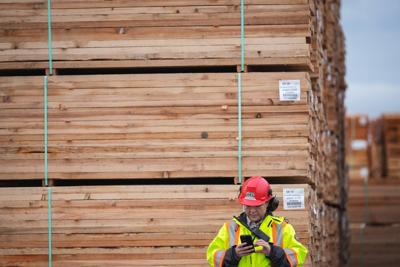VANCOUVER - The B.C. Supreme Court is set to rule on an injunction to halt a blockade against old-growth logging in the Walbran Valley on Vancouver Island, but a lawyer for one of the blockaders says the law is evolving and in need of a “course correction.”Â
The Pacheedaht First Nation has decried the blockade on its traditional territory near Port Renfrew, B.C., claiming it is undermining its authority and should disband.Â
The First Nation said in a statement that forestry is a “cornerstone” of its economy, and is calling for the blockaders to “stand down and leave.”
The statement came after Tsawak-qin Forestry Inc., a firm co-owned by the Huu-ay-aht First Nations and Western Forest Products Inc., filed a lawsuit last week in B.C. Supreme Court alleging that “a group of largely unknown individuals” began the blockade of a road on Aug. 25.Â
The lawsuit sought an injunction to halt the blockade, alleging it’s wrongfully preventing Tsawak-qin and its contractors from “engaging in lawful forestry activities” on Pacheedaht territory.Â
Benjamin Isitt, a lawyer for Pacheedaht elder Bill Jones, who opposes the logging activity and is among the blockaders, said after the hearing that the injunction application was heard in court in Vancouver on Thursday morning, but the judge reserved her decision until Friday.Â
Isitt said Jones has also filed a legal challenge against the Pacheedaht First Nation in Federal Court, claiming the Nation has a “pattern” of consenting to environmentally and culturally harmful practices on its territory without consulting him.
“It’s not a decision he made lightly,” Isitt said of his 85-year-old client, who is named in the injunction lawsuit. “That pattern has to end.”Â
Isitt said old-growth logging remains a “core business” for many firms and contractors on Vancouver Island, while he said the provincial government has enabled the practice and courts have typically sided with industry.Â
“The case law in B.C. has been moving in a very disturbing direction that clearly prioritizes the commercial interests of private industry over the ecological value of old growth forests and associated cultural values for Aboriginal Peoples and others,” he said.Â
“A course correction is needed, but injunctions should not be automatically issued to industry.”Â
He said a recent decision out the Ontario Court of Appeal acknowledged that climate change was putting lives at risk, and that decision could contribute to other courts’ findings in cases that pit industry against those with environmental concerns.Â
“We say that the law continues to evolve with respect to climate change and that there’s been major developments in the law,” he said. “So previous injunction decisions in B.C. were decided without the benefit of these factual findings.”Â
A lawyer for the logging firm did not respond to a request for comment Thursday.Â
The Pacheedaht First Nations statement included supportive comments from representatives of neighbouring First Nations, including Chief Councillor John Jack of the Huu-ay-aht First Nations.
“If we continue to allow protesters and blockaders to undermine Pacheedaht’s sovereignty, this sets a dangerous precedent for First Nations across B.C. and Canada,” Jack said.Â
“Revenues from these harvesting activities pay for social services, housing, health care, child and elder care, education, and so much more for our citizens and community members.”
This report by The Canadian Press was first published Sept. 11, 2025.Â



























To join the conversation set a first and last name in your user profile.
Sign in or register for free to join the Conversation